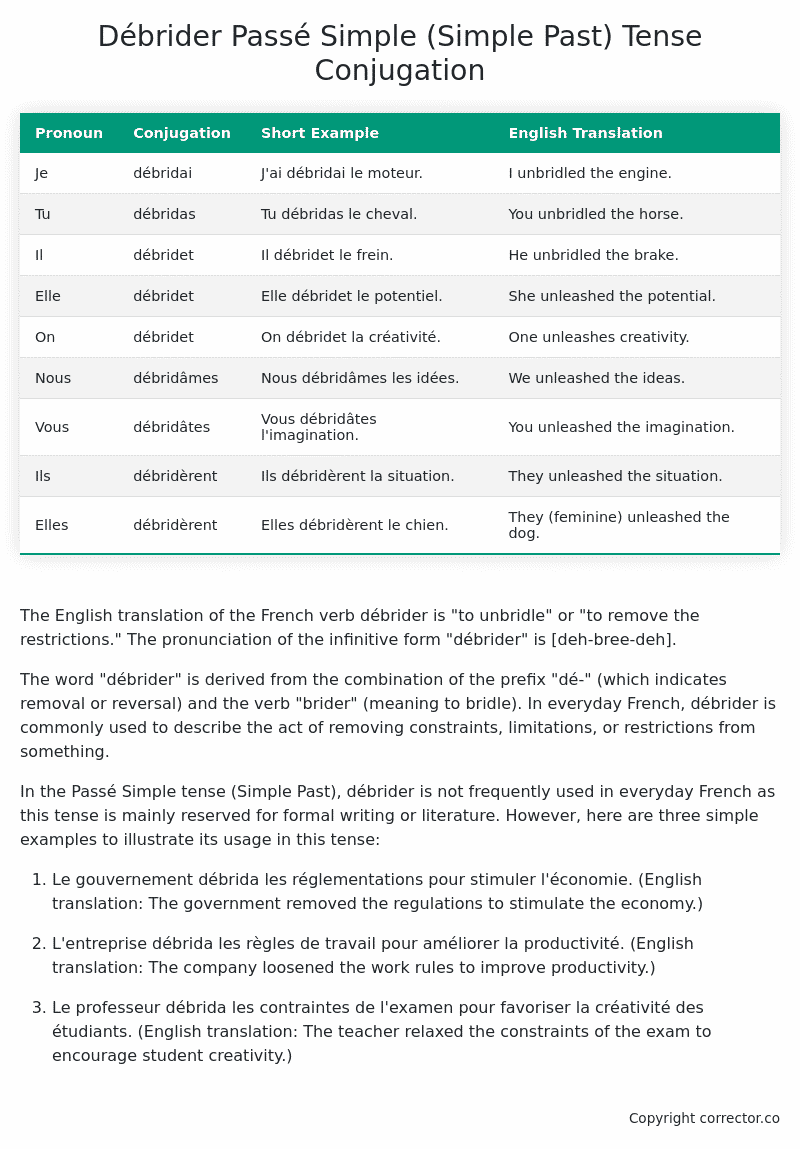Passé Simple (Simple Past) Tense Conjugation of the French Verb débrider
Introduction to the verb débrider
The English translation of the French verb débrider is “to unbridle” or “to remove the restrictions.” The pronunciation of the infinitive form “débrider” is [deh-bree-deh].
The word “débrider” is derived from the combination of the prefix “dé-” (which indicates removal or reversal) and the verb “brider” (meaning to bridle). In everyday French, débrider is commonly used to describe the act of removing constraints, limitations, or restrictions from something.
In the Passé Simple tense (Simple Past), débrider is not frequently used in everyday French as this tense is mainly reserved for formal writing or literature. However, here are three simple examples to illustrate its usage in this tense:
-
Le gouvernement débrida les réglementations pour stimuler l’économie.
(English translation: The government removed the regulations to stimulate the economy.) -
L’entreprise débrida les règles de travail pour améliorer la productivité.
(English translation: The company loosened the work rules to improve productivity.) -
Le professeur débrida les contraintes de l’examen pour favoriser la créativité des étudiants.
(English translation: The teacher relaxed the constraints of the exam to encourage student creativity.)
Table of the Passé Simple (Simple Past) Tense Conjugation of débrider
| Pronoun | Conjugation | Short Example | English Translation |
|---|---|---|---|
| Je | débridai | J’ai débridai le moteur. | I unbridled the engine. |
| Tu | débridas | Tu débridas le cheval. | You unbridled the horse. |
| Il | débridet | Il débridet le frein. | He unbridled the brake. |
| Elle | débridet | Elle débridet le potentiel. | She unleashed the potential. |
| On | débridet | On débridet la créativité. | One unleashes creativity. |
| Nous | débridâmes | Nous débridâmes les idées. | We unleashed the ideas. |
| Vous | débridâtes | Vous débridâtes l’imagination. | You unleashed the imagination. |
| Ils | débridèrent | Ils débridèrent la situation. | They unleashed the situation. |
| Elles | débridèrent | Elles débridèrent le chien. | They (feminine) unleashed the dog. |
Other Conjugations for Débrider.
Le Present (Present Tense) Conjugation of the French Verb débrider
Imparfait (Imperfect) Tense Conjugation of the French Verb débrider
Passé Simple (Simple Past) Tense Conjugation of the French Verb débrider (You’re reading it right now!)
Passé Composé (Present Perfect) Tense Conjugation of the French Verb débrider
Futur Simple (Simple Future) Tense Conjugation of the French Verb débrider
Futur Proche (Near Future) Tense Conjugation of the French Verb débrider
Plus-que-parfait (Pluperfect) Tense Conjugation of the French Verb débrider
Passé Antérieur (Past Anterior) Tense Conjugation of the French Verb débrider
Futur Antérieur (Future Anterior) Tense Conjugation of the French Verb débrider
Subjonctif Présent (Subjunctive Present) Tense Conjugation of the French Verb débrider
Subjonctif Passé (Subjunctive Past) Tense Conjugation of the French Verb débrider
Subjonctif Imparfait (Subjunctive Imperfect) Tense Conjugation of the French Verb débrider
Subjonctif Plus-que-parfait (Subjunctive Pluperfect) Tense Conjugation of the French Verb débrider
Conditionnel Présent (Conditional Present) Tense Conjugation of the French Verb débrider
Conditionnel Passé (Conditional Past) Tense Conjugation of the French Verb débrider
Conditionnel Passé II (Conditional Past II) Tense Conjugation of the French Verb débrider
L’impératif Présent (Imperative Present) Tense Conjugation of the French Verb débrider
L’impératif Passé (Imperative Past) Tense Conjugation of the French Verb débrider
L’infinitif Présent (Infinitive Present) Tense Conjugation of the French Verb débrider
L’infinitif Passé (Infinitive Past) Tense Conjugation of the French Verb débrider
Le Participe Présent (Present Participle) Tense Conjugation of the French Verb débrider
Le Participe Passé (Past Participle) Tense Conjugation of the French Verb débrider
Struggling with French verbs or the language in general? Why not use our free French Grammar Checker – no registration required!
Get a FREE Download Study Sheet of this Conjugation 🔥
Simply right click the image below, click “save image” and get your free reference for the débrider Passé Simple tense conjugation!

Débrider – About the French Passé Simple (Simple Past) Tense
Formation
Usage
Narration
Historical Context
Interactions with other tenses
Passé Composé
Imparfait
Conditional and Subjunctive
Summary
I hope you enjoyed this article on the verb débrider. Still in a learning mood? Check out another TOTALLY random French verb conjugation!


